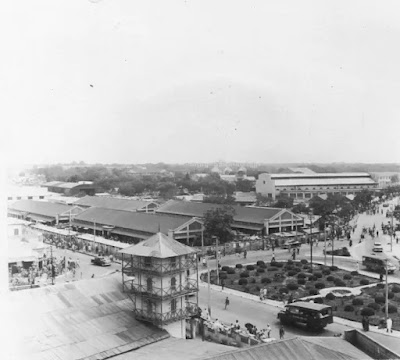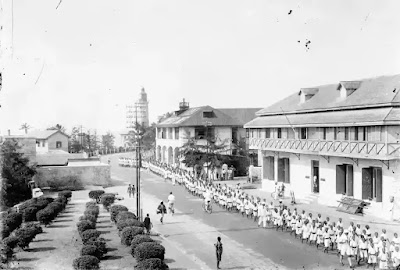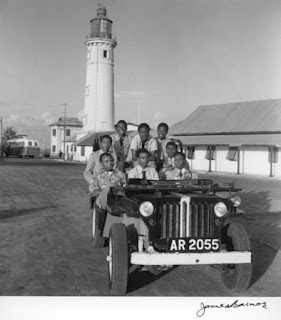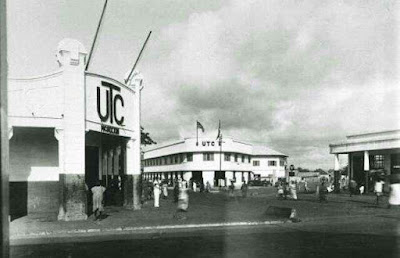 |
| Accra Central Post Office |
What led to the British colonial government moving their administration from Cape Coast to Accra, and how did the economic, social, and cultural organization of Accra present new challenges to the colonial authorities? How did the British attempt to regulate and order the city, and how did African residents respond to these interventions?
 |
The central police headquarters of the motor traffic transport unit, on the corner of Kwame Nkrumah Avenue and Kinbu Street, 1935 |
The British colonial government moved their administration from Cape Coast to Accra in 1877 due to protests over the imposition of new taxes and discontent over the abolition of slavery. Accra was a viable commercial alternative with economic prospects, and considerations of health and appropriate urban residence standards also played a role. The building of European forts as trading posts in the 17th century was central to the development of Accra.
The political, economic, social, and cultural organization of Accra presented new challenges to the British colonial authorities. The city had a highly cosmopolitan culture shaped by Afro-European families, Afro-Brazilian returnees, Hausa migrants, and Akan traders, which developed within and alongside indigenous political and social institutions.
 |
| Accra Town Views |
The British attempted to regulate and order the city through decongestion and urban development plans that failed to account for either the spiritual and social significance of space or the social and economic networks that operated within that space. Proposed technological solutions to perceived problems with sanitation disrupted local health practices and worsened sanitary conditions.
 |
A procession of senior students of the Accra Royal school during the Empire Day celebrations. In the background is the lighthouse, the Bible House, and the current M&G pharmaceutical company building |
In response to African adaptations and resistance, British and African colonial agents created new regimes of regulation and order, passing an increasingly intrusive series of regulations that sought to dictate the built space and socioeconomic practices of urban life in Accra.
 |
Adorso House, Jamestown, 1929. The residence of the Vanderpuije family was also a popular spot for wedding photos
Zoning and other regulatory practices sought to separate public and private, residential and commercial activities, create new standards for commerce, and set aside prime urban real estate for expatriate businesses. Accra residents often ignored colonial regulations and reforms or adapted technological systems to better suit the realities and needs of everyday life.
Accra in 1950
The original Jamestown Light House, erected by the British at James Fort in 1871, was later substituted in the 1930s with the present-day Accra Light, towering at a height of 28 meters (92 feet). Situated at an elevation of 34 meters (112 feet) above sea level, the light boasts a remarkable visibility of 16 nautical miles (30 kilometers).
Horse racing was a popular sport in Accra since the late 1870s when a race course was first built near Jamestown. Initially, the sport was associated with the colonial elite and gradually spread among the Gold Coast masses who used to gather to watch. The races were a place to see and be seen, and members of the audience often dressed up in the latest fashions.
There were various competitive events, including the Governors Cup, The Accra Turf Club Races, The Brandford Cup, and the National Cup. Apart from colonial officials and European expatriates, African horse racers and jockeys, many from Nigerian and Hausa states and communities, were also part of the vibrant horse racing community.
In the 1850s, Hermann Ludwig Rottman established UTC (Union Trade Company) in the Gold Coast (now Ghana) to supply European goods to missionaries. He grew the business into a highly profitable import-export enterprise and expanded it further by marrying Regina Hesse, a teacher from a wealthy Afro-European family. UTC had multiple branches in Nigeria, Cameroon, Ghana, and India and was a well-known name in these regions.
 |
| UTC , Accra Gold Coast |
The company played a significant role in the economic and social history of Accra and the country as a whole. It was originally part of the Basel Mission's Trading Company but rebranded to distance itself from its German roots and to prevent the British from seizing their assets during and after World War I. The UTC of Basel ceased operations in 1999. (Sources: H. Ni-Adziri Wellington, Veit Arlt)
In 1937, a group of people from Jamestown marched down Accra High Street. The building of the 'English Church Mission' is visible in the background, and it still exists today as the Anglican Bookshop on John Evans Atta Mills High Street. Visit our Instagram story highlights to see pictures of individuals from Accra in our "Humans of Accra Past" series.
Korle Bu Teaching Hospital, the premier tertiary healthcare facility in Ghana, was established on October 9, 1923. The facility was built under the administration of Sir Frederick Gordon Guggisberg, then, the Governor of the Gold Coast, as a General Hospital to attend to the health needs of the people. Korle Bu, in the local Ga parlance means ‘the valley of the Korle Lagoon.














